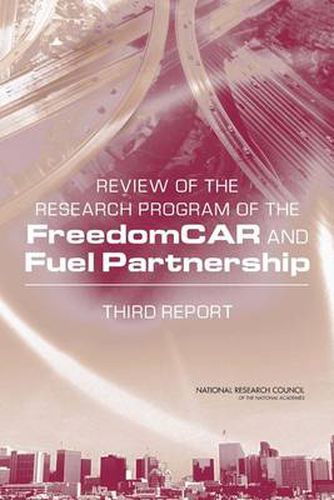Readings Newsletter
Become a Readings Member to make your shopping experience even easier.
Sign in or sign up for free!
You’re not far away from qualifying for FREE standard shipping within Australia
You’ve qualified for FREE standard shipping within Australia
The cart is loading…






The public-private partnership to develop vehicles that require less petroleum-based fuel and emit fewer greenhouse gases should continue to include fuel cells and other hydrogen technologies in its research and development portfolio. The third volume in the FreedomCAR series states that, although the partnership’s recent shift of focus toward technologies that could be ready for use in the nearer term–such as advanced combustion engines and plug-in electric vehicles–is warranted, R&D on hydrogen and fuel cells is also needed given the high costs and challenges that many of the technologies must overcome before widespread use. The FreedomCAR (Cooperative Automotive Research) and Fuel Partnership is a research collaboration among the U.S. Department of Energy, the United States Council for Automotive Research - whose members are the Detroit automakers–five major energy companies, and two electric utility companies. The partnership seeks to advance the technologies essential for components and infrastructure for a full range of affordable, clean, energy efficient cars and light trucks. Until recently, the program primarily focused on developing technologies that would allow U.S. automakers to make production and marketing decisions by 2015 on hydrogen fuel cell-powered vehicles. These vehicles have the potential to be much more energy-efficient than conventional gasoline-powered vehicles, produce no harmful tailpipe emissions, and significantly reduce petroleum use. In 2009, the partnership changed direction and stepped up efforts to advance, in the shorter term, technologies for reducing petroleum use in combustion engines, including those using biofuels, as well as batteries that could be used in plug-in hybrid-electric or all electric vehicles.
$9.00 standard shipping within Australia
FREE standard shipping within Australia for orders over $100.00
Express & International shipping calculated at checkout
The public-private partnership to develop vehicles that require less petroleum-based fuel and emit fewer greenhouse gases should continue to include fuel cells and other hydrogen technologies in its research and development portfolio. The third volume in the FreedomCAR series states that, although the partnership’s recent shift of focus toward technologies that could be ready for use in the nearer term–such as advanced combustion engines and plug-in electric vehicles–is warranted, R&D on hydrogen and fuel cells is also needed given the high costs and challenges that many of the technologies must overcome before widespread use. The FreedomCAR (Cooperative Automotive Research) and Fuel Partnership is a research collaboration among the U.S. Department of Energy, the United States Council for Automotive Research - whose members are the Detroit automakers–five major energy companies, and two electric utility companies. The partnership seeks to advance the technologies essential for components and infrastructure for a full range of affordable, clean, energy efficient cars and light trucks. Until recently, the program primarily focused on developing technologies that would allow U.S. automakers to make production and marketing decisions by 2015 on hydrogen fuel cell-powered vehicles. These vehicles have the potential to be much more energy-efficient than conventional gasoline-powered vehicles, produce no harmful tailpipe emissions, and significantly reduce petroleum use. In 2009, the partnership changed direction and stepped up efforts to advance, in the shorter term, technologies for reducing petroleum use in combustion engines, including those using biofuels, as well as batteries that could be used in plug-in hybrid-electric or all electric vehicles.